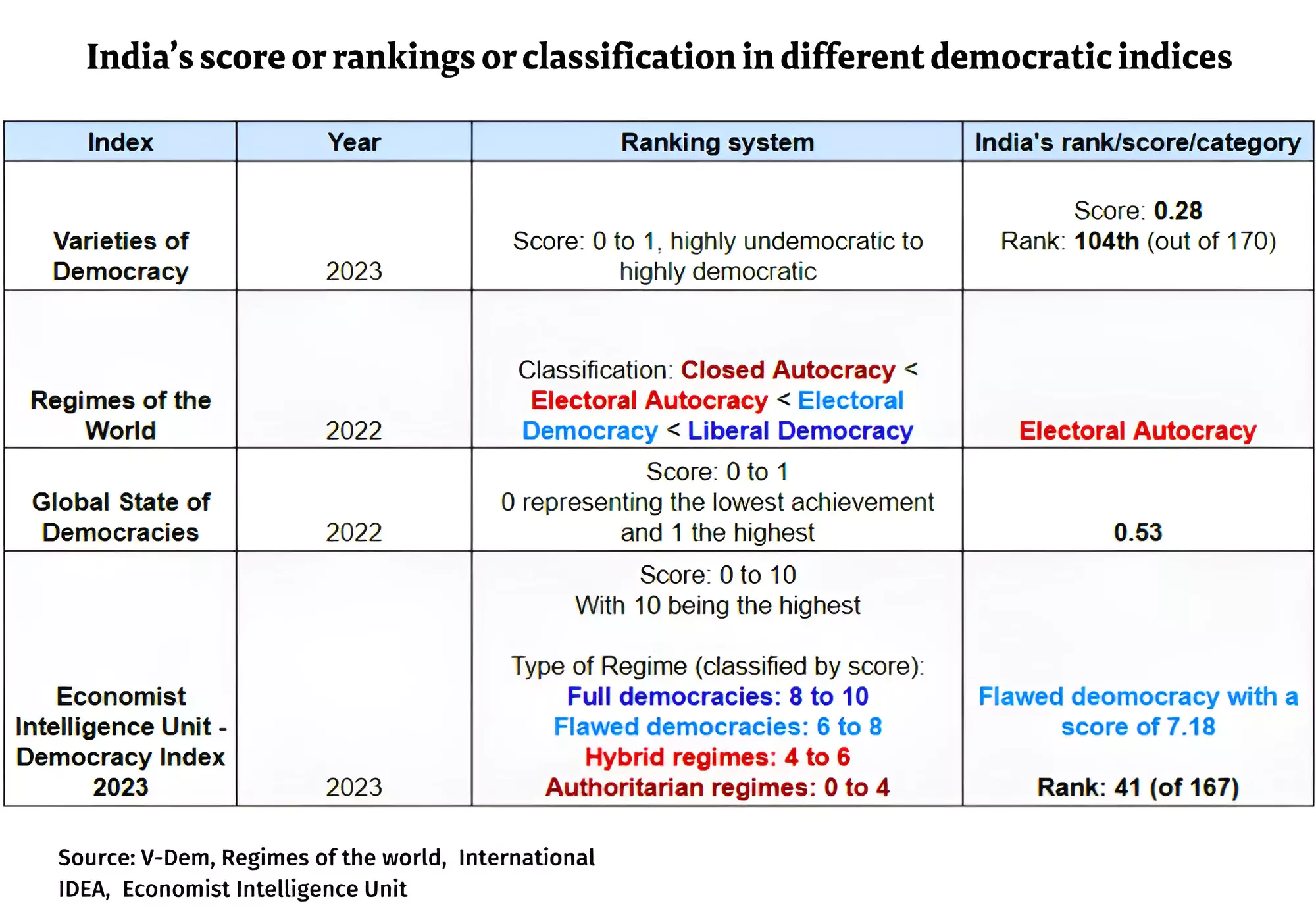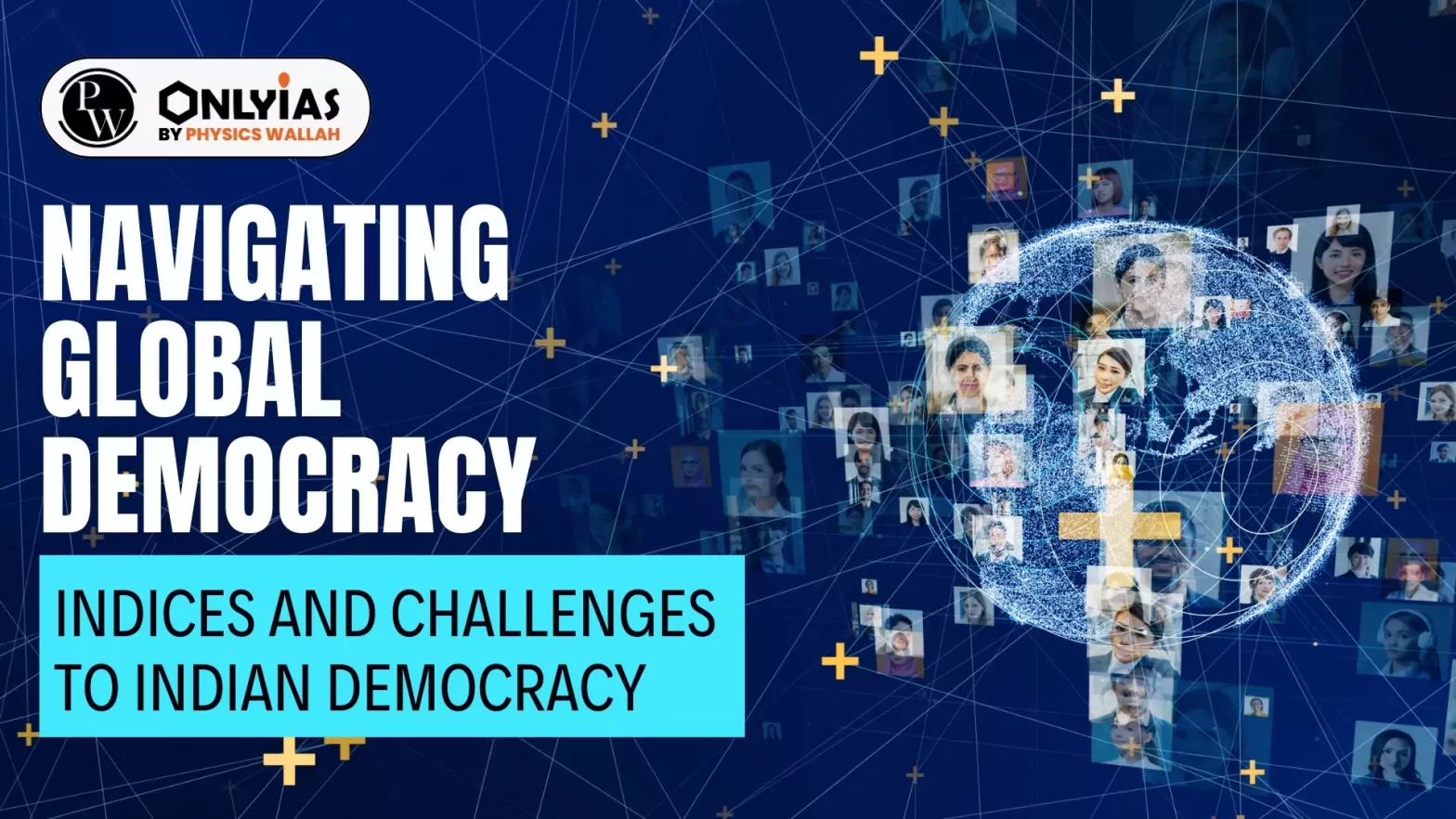Context
In recent years, global indices measuring democracy have downgraded India’s democratic standing, which the Indian government has refuted. The government now plans to release its democracy index.
| Autocracy: It is a system of government in which absolute power is held by the ruler, known as an autocrat. |
Democracy Report 2024
- V Dem Institute: The recent democracy index 2024 termed India “one of the worst autocracies”. According to this index, India ceased to be a democracy in 2018. Freedom House: It categorized India as only ‘partly free’.
- The Economist Intelligence Unit: It categorized India as only home to a “flawed democracy”.
- Government Response: India has previously denounced all global rating assessments of Indian conditions, from democracy and press freedom to hunger, human development and happiness.

Impact of Negative Standings on Democracy Indices on India
- Impact on Rating: The negative commentary by think tanks and agencies threatens India’s sovereign ratings and its ranking on the World Bank’s Worldwide Governance Indicators.
- Impact on Image: Such a downgrade ranking adversely impacts India’s image. India, for instance, ranks between Niger (which is ruled by a military junta) and Ivory Coast and is in the same category as Palestine.
Significance of Democracy Indices
- Such indices capture important big-picture dynamics and trends in democracy.
- They offer ways to benchmark the strengths and weaknesses of political regimes.
- They make different components comparable over periods and across geographies.
- Together, these indices “comprise a combination of quantitative assessments.
- Example: The distribution of seats in the national legislature among political parties and qualitative judgements like whether safeguards against corruption are effective.
Global Democracy Indices
- The V Dem Institute:
- It has published its annual assessment of 202 countries since 1789.
- The Economic Intelligence Unit:
- It assesses the electoral, liberal, participatory and effective nature of democracies since 2006.
- U.S.-based Freedom House:
- Since 1973, the U.S.-based Freedom House has come up with its assessment of civil liberties and political rights.
- Others:
- The Lexical Index
- Boix-Miller-Rosato Coding
- Bertelsmann Transformation Index
- Worldwide Governance Indicators
- International IDEA’s Global State of Democracies Report.
- All agree that democracy is a political system in which citizens get to participate in free and fair elections (electoral democracy).
- Democracies are also liberal societies, which invest in the civic rights of citizens and offer them protections.
|
Limitations of Global Indices
-
Subjectivity and Credibility:
- There is a degree of subjectivity that impacts the indices’ credibility and precision.
- Evaluations are still based on the judgement of researchers and coders rather than tangible characteristics.
- Example: V-Dem’s “egalitarian” indicator assesses the equality of social groups in the political arena, such as how many political parties are present in the country.
-
Neutrality:
- Questions have been raised on the strength of the data, evidence and neutrality of people (professors, authors, and intellectuals) who conducted the surveys.
-
Flawed Methodology:
- The methodology is flawed, sample sizes inadequate, and that these indices favour cultural bias and subjective opinion over objective metrics.
- Example: India, for instance, ranks between Niger (which is ruled by a military junta) and Ivory Coast, and is in the same category as Palestine.
- However, on fair elections or electoral participation, India is “doing as well as any other democracy,”.
-
Dimensions Beyond Electoral Democracy:
- Some indices have a “differential item functioning” to adjust for variations and biases between experts.
- Example: V-Dem’s model requires researchers to state uncertainties, compare disagreements between experts, and produce best and worst estimates of many indicators.
-
Workings of Aggregation Model:
- There is also a concern over the workings of the index’s aggregation model. Experts’ judgment is used to decide which metrics to include and how to weigh each appropriately.
- However, it remains unclear why some subindices were chosen and why other subindices are weighted less.
-
Scope of Countries:
- Another concern is over the scope of countries included in these indices. Only some indices such as Freedom House and Lexical Index survey non-independent and microstates.
- Smaller countries may thus be overlooked in certain cases.
-
Perceived Ideological Discrepancy:
- It is another criticism, partly due to the unclear definition of democracy itself.
- Example: Lesotho suffered a military coup in 2014 and is assigned a higher score than India. And if economically unequal countries such as Brazil are democratic, how is India classified as an electoral autocracy?
-
Unsymmetrical Outputs:
-
- Indices use different patterns, such as the EIU rank, which goes from 0 to 10; and V-Dem’s rank, which goes from 0 to 1. Others also classify the degree of democracy, from autocracy to anocracy to democracy in Polity’s Index, etc.
-
Misleading International Parameters:
- Misleading Parameters are widely used, such as those that measure childhood stunting, female labour force participation rate and life expectancy at birth.
Possible Approaches that India Can Follow on the Global Democracy Indices
- Changes in the Global Indices: Amendments to flawed parts of the indices are needed to capture the on-ground realities of governance.
- The Office of the United Nations High Commissioner for Human Rights has endorsed using observational, objective data over the judgment-based methodology for such assessments to make them more broadly acceptable.
- Discussion and Deliberation: Reporting Institutions need to take suggestions from countries, discuss issues, and overcome them to produce better and more acceptable reports.
- Adopt a Learning & Enhancement View: Countries need to learn from each other’s best practices and take the ranks as a challenge to do better for a better country and World.
|
Democracy in India
- Refers: The term ‘democracy’ comes from the Greek word “demokratia,” which means “rule of the people.” In a democracy, the power rests with the people.
- Definition: In the words of Abraham Lincoln, democracy is a “government of the people, by the people, for the people”.
- Characteristics Features of Indian Democracy: Popular Sovereignty, Universal Adult Suffrage, Rule of Law, Separation of Power, Independent Judiciary, Free and Fair Elections, Multi-Party System, Secularism, Free Press and Independent Civil Society.
Challenges to Indian Democracy
- Legislative Decline: The suspension of MPs denies them the right to participate in Legislative debate and discussion, a fundamental feature of parliamentary democracy.
- Challenge of Casteism: Casteism plays a dominant role in Indian polity. Many caste pressure groups like Scheduled Caste Federation, etc. influence those in power by different methods to meet their demands.
- Example: Political parties like the AIADMK, DMK, and BSP have emerged to protect the interests of the backward classes.
- Communalism in Politics leads to the formation and growth of pressure groups that protect and promote the community’s specific interests.
- It also leads to intolerance, suspicion and fear towards members of the other communities.
- Example: According to National Crime Records Bureau data, over 2,900 communal violence cases were registered in the country in the last five years.
- Judicial Overreach is undesirable in a democracy and goes against the principle of separation of powers.
- Example: In the Shyam Narayan Chouksey vs. the Union of India case, the SC mandated that the National Anthem be played in movie theatres. It was seen as an instance of judicial overreach.
- Freedom of Press: It may lead to easier manipulation of news, and the spread of misinformation and fake news undermines public trust.
- Example: In 2023, India ranked 161st among the 180 countries in the World Press Freedom Index.
- Expansion of Democratic Participation: This challenge of Indian democracy involves the practical aspects of:
- Ensuring greater power to local governments.
- Extension of federal principles to all the units of the federation.
- Inclusion of women and minority groups.
- Criminalisation of Politics: This challenge of Indian democracy reflects money and muscle power, violence, lack of electoral ethics, insufficient society like minorities and women etc.
- 43% of those who won national parliament seats at the 2019 general election had been charged with a crime.
- In the Corruption Perceptions Index (CPI), 2023, India is placed 93rd out of 180 countries, a slight decline from its 85th position in 2022.
- Challenge of Violence: Violence severely affects India’s democracy, secularism, human rights, social harmony, national security and development.
- Regional Economic Differences: Low-wage, low-skilled jobs remain the probable form of employment for millions of young Indians, particularly in poorer, populous states such as Uttar Pradesh.
- Other Challenges: Illiteracy, poverty, gender discrimination, etc.
Various Supreme Court Judgements associated with Indian Democracy
- Keshavananda Bharati vs. State of Kerala, 1973: Give Basic Structure Doctrine, which upheld essential features of democracy such as separation of powers, federalism, and judicial review.
- Indira Nehru Gandhi vs. Raj Narain, 1975: Reiterated the basic principle of democracy: the rule of law.
- Maneka Gandhi vs. Union of India, 1978: The court ruled that the right to personal liberty and due process of law are fundamental rights.
- S.R. Bommai vs. Union of India, 1994: On upholding quasi-federal nature of Indian democracy.
- Justice K. S. Puttaswamy (Retd.) vs. Union Of India, 2017: The Supreme Court ruled that the right to privacy is a fundamental right that emphasises the dignity of every individual’s life.
|
Way Forward
- Follow Democratic Values: India needs to uphold constitutional values and democratic principles.
- Safeguard Federalism: To promote inclusivity and diversity, India needs to take action to safeguard federalism and decentralize power.
- Transparent Electoral Process: It’s time to ensure the integrity of the electoral process.
- Approach Basic Human Rights: India must have a rational, planned and scientific economic order to empower every citizen by providing them with fundamental human rights.
- Inclusive Development: It is a key to development. To ensure inclusive policy-making and policy implementation, democratic institutions must be broadened to include civil society, private agencies, and local government.
- Collaborative Approach: At the global level, a collaborative approach needs to be accepted with a broad consensus on minimum rules and rights for the citizens.
Also Read: Prevention Of Money Laundering Act, 2002
| Prelims PYQ (2021):
We adopted parliamentary democracy based on the British model, but how does our model differ from that model?
1. As regards legislation, the British Parliament is supreme or sovereign but in India, the power of the Parliament to legislate is limited.
2. In India, matters related to the constitutionality of the Amendment of an Act of the Parliament are referred to the Constitution Bench by the Supreme Court.
Select the correct answer using the code given below.
(a) 1 only
(b) 2 only
(c) Both 1 and 2
(d) Neither 1 nor 2
Ans: (c) |
![]() 6 Apr 2024
6 Apr 2024

